#ursula k leguin
Explore tagged Tumblr posts
Text
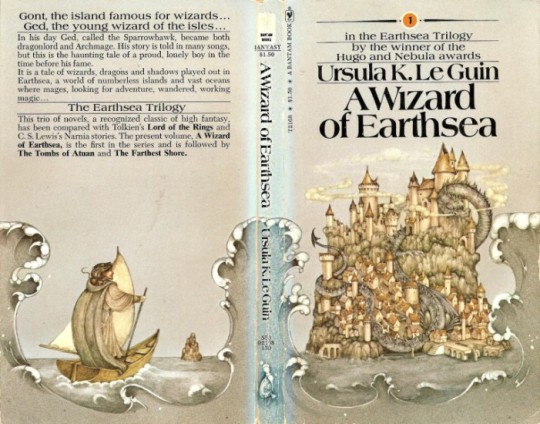
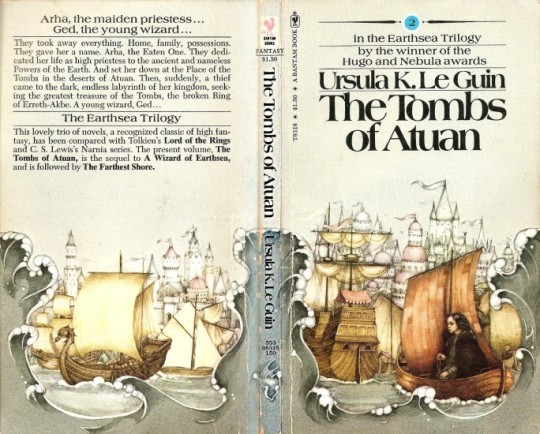
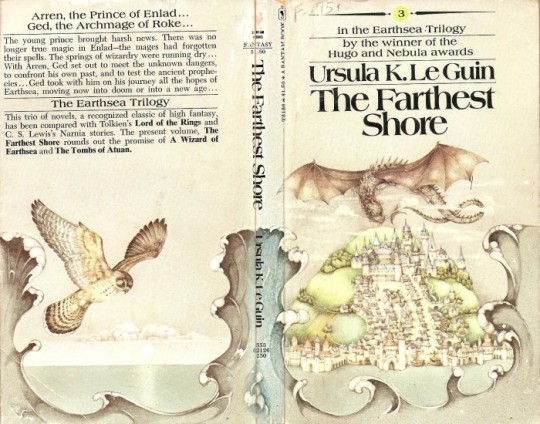
A Wizard Of Earthsea by Ursula K. LeGuin



A Wizard Of Earthsea / The Tombs Of Atuan / The Farthest Shore
Art by Pauline Ellison
Bantam Books (1975)
#Paperback Cover#Paperback Art#A Wizard Of Earthsea#Ursula K LeGuin#Pauline Ellison#Fantasy#Vintage#Art#Paperback#Paperbacks#Earthsea#The Tombs Of Atuan#The Farthest Shore#Dragons#Earthsea Trilogy#Bantam Books#Bantam#1975#1970s#70s
175 notes
·
View notes
Text

"Books aren’t just commodities; the profit motive is often in conflict with the aims of art. We live in capitalism, its power seems inescapable — but then, so did the divine right of kings. Any human power can be resisted and changed by human beings. Resistance and change often begin in art. Very often in our art, the art of words." Ursula K LeGuin
#ursula k leguin#patch#diy#im so happy with how this came out#(it only took three tries to get the spacing right and then i misspelled a word but here we finally are!)
44 notes
·
View notes
Text
30 books for $18USD/$27AUD, which isn't bad. But what was notable for me is that many of these books don't seem to be available in Australia as ebooks at all. Yet Australians (and presumably other non-Americans!) can buy them from this bundle. So now I finally have an ebook of Steering the Craft, hooray, I've wanted one for ages.
Important note: You need to be logged into an existing Kobo account, and get them as Kobo ebooks, also you must select EVERY BOOK when you redeem your code, or lose them forever! Very strange way of doing things, but it is what it is.
Closes December 7, 2024.
80 notes
·
View notes
Text
Having read The Left Hand of Darkness, The Furthest Shore, Tehanu, Powers, The Eye of the Heron and now The Beginning Place from LeGuin, I'm starting to think that she just really likes walking. Young Ursula read Tolkien and she thought, well, wizards are okay, dragons are fine, I don't much care for the rest of this high fantasy stuff, but you know what's brilliant? Walking. Walking and walking and walking and walking some more. You can be in a boat for a little while, but then more walking. What if there were two people who loved each other and then they had to walk and walk and walk and walk and nothing much happened except walking being difficult, and this walking and walking was the climax of the whole book? What if love and faith and heroism was: walking and walking and walking?
55 notes
·
View notes
Text
The Ones Who Found The City
Ursula K. LeGuin's "The Ones Who Walk Away from Omelas" is a classic short story, and obviously I knew of it, but I'd never actually read it until recently. Well, I finally got around to it, and as many timeless classics do, it got stuck in my brain. This story is my - response? homage? sequel? pale imitation? - to it. I suggest you go and read "The Ones Who Walk Away from Omelas" if you haven't. Not because it's actually required reading for this story - I think it stands on its own more or less okay - but because it is a classic for a reason.
---
Initially, no one is quite certain of what they’ve found when the Animus breaches the next manifold layer. This is in and of itself expected, of course. Exploring psychspace is by its very nature an unpredictable venture. Each of the various infinite layers is unique and bizarre in its own way, reflecting the archetypal underpinnings of an entire species present, past, or future across an infinitude of possible realities. The crew of the Animus, therefore, has seen things so utterly alien and inexplicable that only the rigors of their training and the care put into their psychic warding saved them from insanity.
It is somewhat disappointing, then, to find that this sub-domain is just a city. Definitely not Terranic, certainly not, but still following the Terranic modality, with no more than a seven-degree quantum drift.
“Towers,” Thromby says into the recorder as they sit at their post at the nose of the Animus’s command center. “Following the standard skyscrape pattern. Unclear if they’re domiciles or business centers or both. Coastal city, bay appears to be oceanic rather than lake. Pleasing blend of urbanization with natural setting.” They glance at Vigil. “Anything on the lifescope?”
Vigil shakes his head. “Nothing. It’s empty. Totally empty.”
“That’s odd,” Katrina speaks up from the helm. “The city doesn’t show signs of decay or reclamation by nature.”
“Entropy may not work in the usual way in this sub-domain,” Teasha reminds her. “The city itself could be the natural growth, reclaiming the artificial countryside. We’ve seen things like that before.”
Thromby feels Katrina’s unconscious bristling at the subtle reminder that she is the newest member of the crew and thus less experienced in the vagaries of psychspace than everyone else. Next to Vigil, who is only nineteen, she is also the youngest. “I would expect,” Katrina says, her voice cool, “that in a sub-domain so obviously based on human archetypes, entropy and nature-versus-civilization tropes would function more or less as usual.”
“I’m certain you would,” Teasha replies, her voice equally cool. “When you’ve been at this as long as me and Thromby, you’ll learn better.”
“Enough of that,” Thromby says before Katrina can reply. They love Teasha, but she tends to be too harsh on new crewmembers. A defense mechanism, they know, to insulate her from the all-too-common pain of losing them. But Katrina has too much to prove. The clash is natural and to be expected, and even useful at times, but now is not one of them. “Vigil, get me readings on atmosphere, microbiome, and psychic radiation, if any. Katrina, pick a spot on the coast and bring us down there. I want to see if the ocean is actually an ocean or a liminality representation. Teasha, get the Animus tuning to this sub-domain’s resonance frequency. I don’t want any dissociation issues.”
The orders are mostly unnecessary, since everyone already knows what they’re about, but they serve their intended purpose, which is to re-focus everyone on the task at hand and redirect their nervous energies, particularly Katrina’s. Thromby still isn’t sure she’s going to make the cut after this expedition is over, but there’s potential there. They would be foolish to ignore someone with Katrina’s strength of identity grounding.
There are plenty of sub-domains out there where it’s useful to be entirely certain of who you are, and not everyone can be.
---
The first day’s worth of exploration yields more questions than answers, which is normal and expected. Thromby is indeed certain that Katrina’s initial assumption that this is a human-archetypal sub-domain is correct. Human atmosphere, human shadow- and ontological concepts, Terranic fish in the very-real ocean. But the iconography is sparse and mostly nonsensical. It’s clear that the city was able to actually function as a city, but it feels purposeful, designed, in a way that actual cities outside psychspace rarely do.
“It’s a metaphor,” Vigil says as they sit around a campfire on the beach after the first day.
“Well, obviously,” Katrina agrees, and Vigil lights up – both visibly and psychically – at her concordance. Thromby knows Vigil has been nursing burgeoning feelings for Katrina since she joined them, and has so far seen no need to make anything of it. “But a metaphor for what?”
“We don’t have enough data,” Vigil replies. “But I’m certain of it. We just need to keep exploring.”
Thromby takes a bite of the fish they’ve been roasting over the fire. It’s a pleasant change of pace to be able to eat something real, instead of the platonic nourishment suggestions dispensed by the Animus. “Agreed. I’m curious to see what the point of this place was. We have five more days before we have to resurface and the expedition has been quite successful already. I think we can spare the time. Teasha?”
Taking a bite of her own fish, Teasha purses her lips as she chews. “I concur, but I’m uneasy.”
Teasha is their psychometry specialist, so this makes all of them sit up a little straighter. “Are we in danger?” Katrina asks.
“Of course we’re in danger, we’re in psychspace. But in this particular sub-domain? Metaphorical danger, as Vigil says. Ideological or memetic patterning rather than physical.”
Thromby nods. “I suspected that might be the axis of it, here. We will need to split up to cover the necessary ground in the time we have left, so everyone stays in contact while exploring. Mechanical and psychic. No exceptions.”
None of them are particularly happy with this pronouncement, but they see the wisdom of it. It’s distracting and somewhat draining to keep a four-way psychic connection going, especially over distance, but their implanted transceivers sometimes don’t function properly, depending on the sub-domain. Electromagnetism and causality both seem to be standard here, but such things have been known to change in an instant depending on whether the sub-domain is actively malicious or not.
Thromby doesn’t feel any such malice here, though. That doesn’t mean it isn’t present; such things are often quite good at hiding themselves. But they’ve been exploring psychspace for seventy-eight years subjective. They’ve learned to trust their instincts.
---
Two more days of exploration are frustratingly unrevealing. The city is the size of a proper metropolis, and they know it will be impossible to actually explore any significant percentage of it in only a few days, but Thromby is still irritated by their lack of progress. They find evidence of cultural signifiers, rituals, and traditions, but again, the iconography is vague and appears opaque to standard Jungian-Jingweian analysis.
Teasha spends the two days on a different investigative track than the rest of them. “Psychometrically speaking the city is remarkably healthy,” she said on the morning of their second day. “Most locations, metaphorical or otherwise, bear the echoes of trauma or strife, but this place seems to have been almost entirely peaceful. Totally voluntary anarcho-communism or ordnung-socialism, perhaps, without the usual markers of systemic violence inherent to capitalistic or fascistic systems. But there’s a thread somewhere that I keep detecting the edges of.”
“A thread of what?” Thromby asked.
“Pain, of course.”
It is on the evening of their third day in the city that Teasha calls them to her. She uses their transceiver link rather than a psychic summons. “To avoid contamination,” she explains. “I’ve found the source of the thread. Double your usual wardings and enter seclusive patterning before you come inside.”
Thromby does so, of course, though they dislike cutting themselves off from their extrasensory perception. It feels like trying to see with only one eye. When they arrive at Teasha’s location, however, they immediately understand why she insisted on it. The possibility of psychic contamination here is very high.
“What is this?” Katrina asks, holding her nose in disgust.
“The point of the metaphor, of course,” Teasha replies. She indicates the filthy cellar in which they’ve found themselves, the only part of the city so far that has seemed actively decrepit. “I guarantee you that even if we spent the rest of our lives exploring this city we would find only this one place showing any signs of entropy.”
The cellar stinks of excrement, a combination of ammonia and fetid shit, despite the physical processes creating such smells having terminated long ago. The floor is dirt. There are no windows. In one corner there are two mops, their heads stiff with drying waste, and a bucket, the metal bands around its circumference orange with rust.
“They concentrated all of the city’s entropy into a single space?” Vigil asks.
“Not entropy,” Teasha tells him. “Cruelty.”
Katrina gapes, her hand falling away from her nose for a moment. “Come again?”
“Something lived here,” Teasha explains to her. “Or, more precisely, was forced to live here. It functioned as a psychic magnet, of sorts. The functioning of the city relied entirely upon its imprisonment and use as a scapegoat.”
“What was it?” Vigil asks.
“One of the innocence-sacrifice archetypes. An animal or a child. I suspect a child; an animal can feel pain and misery, certainly, but it doesn’t conceive of injustice in the same way a child does.”
Thromby feels their stomach turn a little. “Ah. I see.”
“See what?” Katrina demands.
“The point of the metaphor indeed,” Thromby replies. “This entire city and all its inhabitants, predicated on the suffering on a child. It’s a morality construct, and a good one, too.”
“A good one?” Vigil asks. “It’s grotesque.”
“Your deontological leanings are showing,” Katrina tells him. “From a utilitarian perspective it’s perfect. Nothing exists without imposing an energy burden on the system in which it exists. Even the nourishment suggestions the Animus feeds us in liminal space between manifolds is distilled from universal krill. But this? The concentration of all of a society’s utility burden onto a single individual. The ultimate maximization principle.”
“And your teleological leanings are showing,” Teasha sniffs. “You’re missing the point of the metaphor entirely, Katrina. It isn’t about utility. It’s about cruelty. The cruelty is the point.”
Katrina’s nostrils flare and Thromby cuts in before she can start really arguing. “Enough,” they say. “A conflict here in this space could be dangerous. We’re at the focus of the sub-domain and things have a way of rippling. We’ve discovered the point of the metaphor, so we can go back to the Animus and leave in the morning.”
Both Katrina and Teasha look ready to argue the point with them, but then they master themselves and both nod.
“Do we have to wait until morning?” Vigil asks, looking around the cellar in transparent disgust. “I would prefer to leave sooner rather than later.”
“You know the rules,” Thromby replies. “We don’t transit without everyone being rested. A tired mind is a vulnerable mind.”
Reluctantly, Vigil nods, too. The four of them walk away from the cellar, their thoughts opaque to one another.
---
Thromby is jolted out of sleep by Teasha screaming.
They sit bolt upright and look down at Teasha in the bed next to them. She is clutching at her head, shaking, writhing beneath the sheets. “Teasha!” Thromby snaps. “Focus! Center yourself!” They grab her by the wrists and pry her hands from her face; her nails are leaving bloody marks in her skin.
“Too much, it’s too much!” she shrieks. “I’m lost!”
Thromby forces their way into her mind. She previously gave them her consent for this, knowing that it might be necessary in a moment like this one. What they see there –
“Aquinas,” they say aloud. The implants in Teasha’s cochlear nerves pick up on the trigger word and activate, sending the kill-signal to other implants deeper within her brain. She stops screaming and slumps, unconscious, temporarily brain-dead. When Thromby says the word again she will be switched back on, but for the moment she is safe from the psychic contamination that was attacking her along her psychometric vector.
Which, of course, means that Thromby has to deal with this issue alone.
They dress quickly and exit the Animus into a beautiful summer day. Pennants and banners wave atop the rigging of ships in the harbor, bells sound from the city, and people, so many people, cavort and revel on the beach, in the waves, in the streets. There is laughter, merriment, the intoxicating psychic swell of happiness and excitement. Thromby threads their way through the crowds in the streets – mothers carrying their infants, children running through the streets in elaborate games of some variation of Terran tag, huge parades of horse-drawn carts with animalistic balloon totems floating in the air above them. Vendors call out to Thromby, offering delicious food, intricately made jewelry, amazing clockwork-mechanical toys, sensory-enhancing drugs, and a thousand other variegated temptations. Street musicians play upon cunningly crafted instruments – strings, pipes, percussion, keys – and revelers cavort to the tunes.
Thromby can feel the bright sparks of all of these people in their mind. These are real, thinking, feeling beings. They belong to the metaphor, certainly, but Thromby could speak to them, touch them, verify their self-consciousness and interiority, even invite them to come and join them onboard the Animus and explore psychspace. They could bring them up into the real, return home with them, have a life with them. That is how it has to be, of course. Thromby knows they themself may belong to a different metaphor of a different order, after all. The real is only real because enough people agree it is.
But they do none of these things. They just walk, stolidly, back to where they know they have to go.
Katrina is waiting for them outside the cellar, barring the way in. Thromby has their wards up at triple strength and has been in seclusive patterning since before leaving the Animus, but they don’t need to be psychic to read her mind. Everything she is feeling and thinking is there in plain sight – the proud and defiant way her chin is thrust out, the blaze in her eyes, the way she has her arms crossed and feet at shoulder width. She is ready to fight.
“Let me through,” Thromby says without preamble.
“No.”
Well, that’s their respective positions, Thromby thinks, articulated clearly and easily enough. “Why not?” they ask.
“Vigil consented.”
“Vigil is in love with you and you know as well as I do that consent is a matter of framing,” Thromby snaps. “Move.”
“No. I explained everything to him and he consented. It has nothing to do with whatever feelings he might have for me.”
“That’s bullshit and you know it, but fine. For the sake of argument, tell me how you explained it.”
Katrina hesitates, and Thromby can tell she wasn’t expecting them to actually offer her a chance to proselytize. “The point of the metaphor is that no matter how great and beautiful the society, if it’s predicated on cruelty, it’s unjust,” she says. “Deontological thinking, obviously, but cruelty is by definition nonconsensual. I explained to Vigil that if he allowed it, we could collaboratively put blocks in his mind, purposefully regress him to a childlike mental state, and put him in the cellar to suffer for a specific length of time. Then we can pull him back out, remove the blocks, and even erase the memories of the trauma. The child-Vigil won’t, can’t, consent, but it also won’t exist for more than a day, and pragmatically speaking never will have.”
Thromby massages their temples. “Congratulations. Once again, you have missed the point of the metaphor.”
“Damnit, Thromby, I’m not a child! I have the same training and grounding in theory that you and Teasha do. Everything I’m doing is teleologically sound, and Vigil agreed that with the steps we’re taking –”
“You’re trying to outsmart it,” Thromby cuts her off. “That’s how I know you’ve missed the point. You can’t outsmart this, Katrina. There is no perfect set of circumstances you can construct to get around the simple fact that this city functions, exists, because of deliberate and terrible cruelty. That’s the entire point of it, just like Teasha said. Teasha, who, by the way, is currently in a coma. I had to put her into it to keep Vigil’s misery from damaging her.”
“It’s a thought experiment,” she argues, obviously not addressing the point about Teasha because she knows she won’t win that argument. “There’s always a correct answer for them. The trolley, the Gettier, the –”
“It’s about fucking sin,” Thromby sighs.
“Are you joking right now? You’re going back to the religious well?”
“Yes, because that’s what’s happening right now. The city is a sin, Katrina. The excesses of its beauty, its wonder, its perfection, are obscene precisely because of how and why they function. It’s rooted in the ideology of disgust and taint. Utility, teleology, all of these justifications and rationalizations exist and have their use, but at the end of the day, answer me one question: will you trade places with Vigil?”
Katrina hesitates.
It’s only a bare moment, less than a second, even, but it’s there. And Thromby sees it, and Katrina sees it.
“Yes,” she says, finally.
“I knew that would be your answer. But you know that the answer doesn’t really matter, does it?”
Katrina lowers her head. “No.”
“You know why you hesitated.”
“Yes.” She looks back up at them. “But – there’s no such thing as absolute morality, any more than there’s a single objective reality.”
“Of course there isn’t. And yet, you hesitated.”
They just lock eyes for a few seconds. Then she lowers her gaze again. “And yet, I did.”
Thromby steps past her and opens the cellar.
#writing#my writing#story#short story#short stories#creative writing#omelas#the ones who walk away from omelas#ursula k leguin#leguin#science fiction#sci fi#sci-fi
172 notes
·
View notes
Text


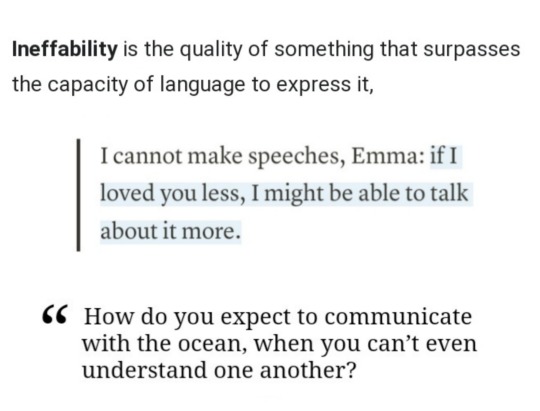


Imagine that you and I shared a personal language, one that only we two could interpret.
Perhaps we do.
Communication (wikipedia) / The Left Hand of Darkness by Ursula K. LeGuin / Solaris (1972) dir. Andrei Tarkovsky / Ineffability (wikipedia) / Emma by Jane Austen / Solaris by Stanislaw Lem / Making Amends - panel 2 by Holly Warburton / To The Lighthouse by Virginia Woolf / Fool's Errand by Robin Hobb
#mine#on love#ursula k leguin#the left hand of darkness#solaris#stanislaw lem#emma#jane austen#holly warburton#to the lighthouse#virginia woolf#realm of the elderlings#fools errand#robin hobb#web weaving
578 notes
·
View notes
Text




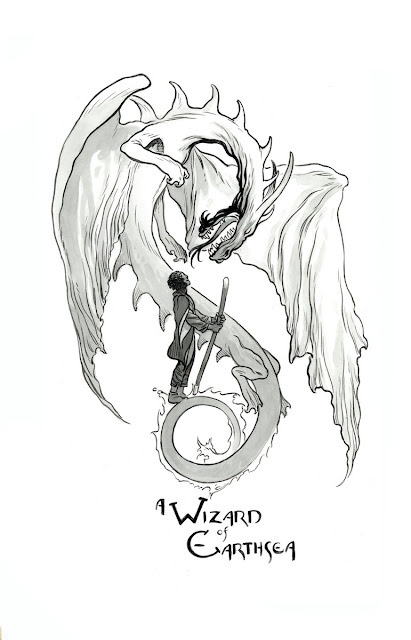

Ink illustrations from Charles Vess for "The Book of Earthsea: The Complete Illustrated Edition" by Ursula K. LeGuin
#earthsea#ursula k leguin#ursula leguin#pulp art#fantasy art#comic art#charles vess#illustration#ink illustration#black and white illustration#b&w illustration#tombs of atuan#wizard of earthsea#dragon art#dragon#earthsea books#fantasy illustration#epic fantasy
25 notes
·
View notes
Text
if the earthsea cycle became the global phenomenon hp did we would have world peace
65 notes
·
View notes
Text

Screaming, crying, throwing up
23 notes
·
View notes
Text

39 notes
·
View notes
Text
The Left Hand of Darkness should be mandatory reading in every school. Change my mind
20 notes
·
View notes
Text

Moon Jupiter and Venus in assembly (James Webb Telescope Discoveries)
* * * *
hymn to time :: ursula k. le guin
Time says “Let there be” every moment and instantly there is space and the radiance of each bright galaxy.
And eyes beholding radiance. And the gnats’ flickering dance. And the seas’ expanse. And death, and chance.
Time makes room for going and coming home and in time’s womb begins all ending.
Time is being and being time, it is all one thing, the shining, the seeing, the dark abounding.
[via "Alive On All Channels"]
#James Webb Telescope Discoveries#Moon#Jupiter#Venus#the heavens#Alive On All Channels#Ursula K LeGuin#time#time and space#coming and going#space
20 notes
·
View notes
Text






About The Kid In The Omelas Hole
You can also get this one with overly pretentious added commentary in the form of a three page essay here
#the ones who walk away from omelas#ursula k leguin#comix#sona tag#fenrir#max#for those who havent read the ones who walk away from omelas: its very easy to find online and only six pages long. wholly reccomend
33 notes
·
View notes
Text
I saw a post saying MisMag had drawn inspo from the Earthsea books by Ursula K LeGuin, so I started reading the Earthsea books by Ursula K LeGuin (read this in the manner of: I saw Cady Heron wearing army pants and flip-flops so I bought army pants and flip-flops (Mean Girls woo!)) ANYWAY I finished the first one last night and can confirm that Evan's journey with his shadow S1 is very much echoed in the experience of the protagonist, which was very satisfying and interesting to read.
However I actually don't think when I saw the post originally that they were talking about Evan's shadow, I think they were talking about season two and the way magic works in general there. I could be wrong but I'll keep reading and report back.
Anyway to continue the reading list theme, I read Key Lime Sky recently and a character in it had a similar character arc to K in the second season, where they're really into performative activism, and the other characters are talking them through it with various amounts of success at various points. Just thought I would drop that here in case anyone else is wanting a MisMag reading list.
I'm so open to further reading recommendations if anyone has any.
#misfits and magic#mismag 2#evan kelmp#earthsea#ursula k leguin#key lime sky#al hess#Autistic protagonists 4eva
8 notes
·
View notes
Text
Whenever shitty parents, or decent parents in a shittier moment, tell their children that they’re lucky, that they should be grateful, that there are starving children in Africa who would love to eat the cauliflower or whatever that kid just refused: the Omelas child is brought into being. As far as I’m concerned, that’s what the Omelas child is, at heart. Not a real starving African child but the conceptual starving African child. Someone whose whole purpose is to suffer so that we can look at them, or even just imagine them, and feel ever so grateful for our own moderately shit lives.
9 notes
·
View notes
Photo


Bertolt Brecht, Life of Galileo. Ursula K LeGuin, Lavinia.
338 notes
·
View notes